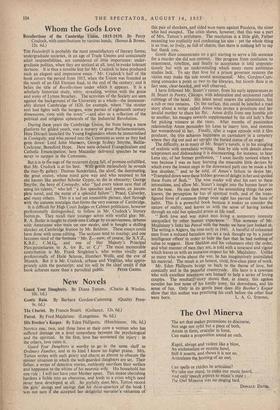Whom the Gods Love
THE Festschrift is probably the most unsatisfactory of literary forms; undergraduate societies, in an age of Trade Unions and consciously adult responsibilities, are considered of little importance: under- graduate politics, when they are noticed at all, tend to evoke tolerant derision. It is thus a notable feat for Mr. Cradock ..to have produced such an elegant and impressive essay. Mr. Cradock's half of the book covers the period from 1815, when the Union was founded as the result of an Old Etonian feud, to the end of the century; and it belies the title of Recollections under which it appears. It is a scholarly historical study, witty, revealing, written with the grace and irony of Lytton Strachey. The activities of the Society are seen against the background of the University as a whole—the immeasur- ably distant Cambridge of 1820, for example, where "the stouter sort had fights with the bargees, wine parties of eighteenth century dimensions,' riots with the town"—and also as a reflection of the political and religious upheavals of the Industrial Revolution.
, During these years the Cambridge Union, far from being a mere platform for gilded youth, was a nursery of great Parliamentarians. Here Disraeli launched the Young Englanders whom he immortalised in Coningsby, and who passed into the Commons as soon as they had gone down: Lord John Manners, George Sydney Smythe, Baillie- Cochrane, Beresford Hope. Here were debated Evangelicalism and Catholic Emancipation; here Macaulay delivered speeches he was never to surpass in the Commons.
But it is in the saga of the recurrent dying fall, of promise unfulfilled, that Mr. Cradock is at his best. With gentle melancholy he reveals the may-fly gallery: Thomas Sunderland, the aloof, the dominating, the great orator, whose mind gave way and who returned to his old haunts like another Scholar Gypsy,. to die in obscurity; George Smythe, the hero of Coningsby, who "had every talent save that of using his talents," who left "a few speeches and poems, an incom- plete novel, and the name of a splendid failure"; Praed, Calverley, and many others. This is a sad yet irresistible picture, shot through with the autumn nostalgia that forms the very essence of Cambridge.
It is difficult for High court Judges or Cabinet politicians, however professionally distinguished, to follow in Mr. Cradock's literary footsteps. They recall their younger selves with wistful glee: Mr. R. A. Butler is taught to climb into College by ex-servicemen, debates with Americans who train on raw steaks, and is bought a shilling shocker, on Cambridge Station by Mr. Baldwin. These essays could have done with some editing. The sections tend to overlap; and one becomes tired of the formula "Mr. Z:—now, of course, Sir X.Y.Z., K.B.E., C.M.C, and one of Her Majesty's Principal Plenipotentiaries to A. (or B., or C.)" The most memorable contribution is Mr. Frank Singleton's, who writes vividly and professionally of Haile Selassie, Humbert Wolfe, and the eve of Munich. But it is Mr. Cradock, urbane and Virgilian, who appro- priately adds the postscript; and his will be the chief credit if this book achieves more than a parochial public. PETER GREEN.


































 Previous page
Previous page